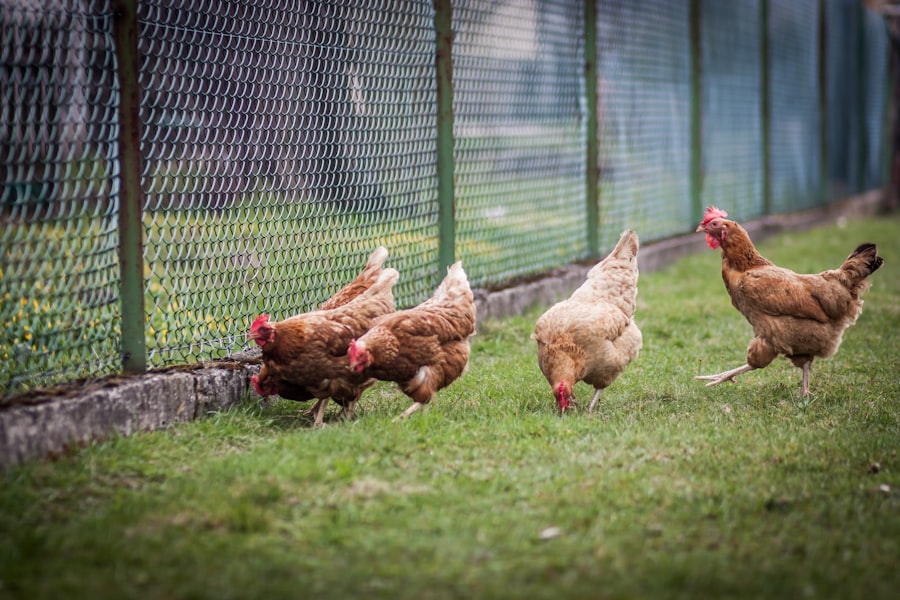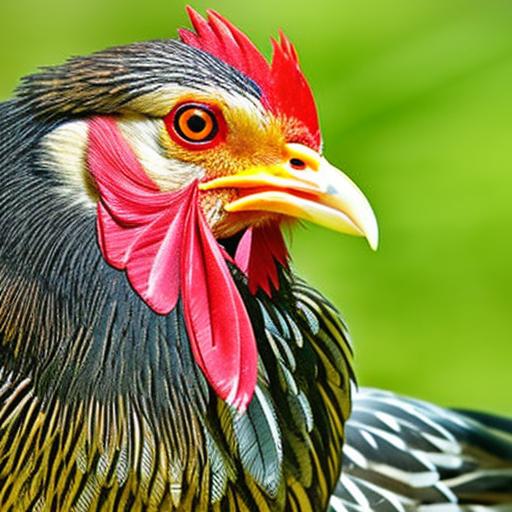Keeping chickens in your yard has become a growing trend in recent years. More and more people are realizing the benefits of raising chickens and enjoying the rewards that come with it. Not only do chickens provide fresh eggs, but they also make great pets and can even help fertilize your garden. If you’re considering keeping chickens in your yard, this article will provide you with all the information you need to get started.
Key Takeaways
- Keeping chickens in your yard can be a rewarding and sustainable hobby.
- Raising chickens can provide fresh eggs, natural pest control, and fertilizer for your garden.
- When choosing a chicken breed, consider factors such as egg production, temperament, and climate adaptability.
- A well-designed chicken coop should provide adequate space, ventilation, and protection from predators.
- Proper feeding, cleanliness, and predator prevention are essential for the health and safety of your chickens.
Benefits of Raising Chickens
One of the biggest benefits of raising chickens in your yard is having a constant supply of fresh eggs. There’s nothing quite like going out to your backyard and collecting eggs for breakfast. Not only are fresh eggs delicious, but they are also more nutritious than store-bought eggs. Chickens that are allowed to roam freely and eat a natural diet produce eggs that are higher in omega-3 fatty acids, vitamin E, and beta-carotene.
In addition to providing fresh eggs, chickens also make great pets. They have unique personalities and can be quite entertaining to watch. Many people find that spending time with their chickens is a great way to relax and de-stress. Chickens are also relatively low-maintenance pets compared to dogs or cats. They don’t require daily walks or grooming, and they can be left alone for a weekend without any issues.
Another benefit of raising chickens is the opportunity to use their manure as fertilizer for your garden. Chicken manure is rich in nitrogen, phosphorus, and potassium, which are essential nutrients for plants. By composting chicken manure and adding it to your garden soil, you can improve soil fertility and promote healthy plant growth. This not only saves money on store-bought fertilizers but also reduces the need for chemical fertilizers, making it an eco-friendly choice.
Choosing the Right Chicken Breed for Your Yard
When it comes to choosing the right chicken breed for your yard, there are several factors to consider. First, you’ll want to think about the size of your yard and how much space you have available. Some chicken breeds are better suited for small yards, while others require more space to roam. You’ll also want to consider the climate in your area and choose a breed that is well-adapted to your local weather conditions.
There are many different types of chicken breeds, each with its own unique characteristics. Some breeds are known for their egg-laying abilities, while others are prized for their meat. Some breeds are more docile and friendly, making them great pets, while others are more active and independent. It’s important to do your research and choose a breed that fits your specific needs and preferences.
Some popular breeds for backyard chicken keeping include the Rhode Island Red, the Plymouth Rock, and the Sussex. These breeds are known for their hardiness, good egg production, and friendly personalities. They are also relatively easy to care for and adapt well to a variety of climates. However, there are many other breeds to choose from, so be sure to explore all your options before making a decision.
Designing and Building a Chicken Coop
Having a chicken coop is essential when keeping chickens in your yard. A chicken coop provides shelter and protection for your chickens, as well as a place for them to lay their eggs. When designing and building a chicken coop, there are several factors to consider.
First, you’ll want to think about the size of your flock and how much space they will need. The general rule of thumb is to allow 4 square feet of coop space per chicken. This means that if you have 4 chickens, you’ll need a coop that is at least 16 square feet in size. It’s always better to err on the side of caution and provide more space rather than less.
Next, you’ll want to think about the layout and design of your chicken coop. It should have separate areas for nesting, roosting, and feeding. It should also have good ventilation to prevent the buildup of moisture and odors. Additionally, it’s important to include windows or vents that can be opened and closed to regulate temperature and airflow.
When it comes to materials, there are many options to choose from. Some people prefer to use wood for their chicken coop because it is natural and provides good insulation. Others prefer to use metal or plastic because they are more durable and easier to clean. Ultimately, the choice of materials will depend on your personal preferences and budget.
Chicken Coop Size and Placement
The size of your chicken coop is an important factor to consider when keeping chickens in your yard. Chickens need enough space to move around comfortably and engage in natural behaviors like scratching and dust bathing. The ideal size of a chicken coop will depend on the number of chickens you have and the amount of space you have available.
As mentioned earlier, a general rule of thumb is to allow 4 square feet of coop space per chicken. This means that if you have 4 chickens, you’ll need a coop that is at least 16 square feet in size. However, it’s always better to provide more space if possible. Chickens that are overcrowded can become stressed and more susceptible to disease.
In addition to size, the placement of your chicken coop is also important. You’ll want to choose a location that is well-drained and provides good sun exposure. Chickens need access to sunlight for vitamin D production, which is essential for their overall health and egg production. It’s also important to choose a location that is protected from strong winds and predators.
When choosing the right location for your chicken coop, there are several factors to consider. First, you’ll want to think about proximity to your house. You’ll want to place the coop in a location that is convenient for you to access and monitor. You’ll also want to consider the noise and odor that chickens can produce, especially if you have close neighbors.
Providing Proper Ventilation and Lighting in Your Chicken Coop

Proper ventilation is essential in a chicken coop to ensure the health and well-being of your chickens. Good ventilation helps remove excess moisture, ammonia, and odors from the coop, which can lead to respiratory problems and other health issues. It also helps regulate temperature and airflow, creating a more comfortable environment for your chickens.
There are several ways to provide proper ventilation in a chicken coop. One option is to install windows or vents that can be opened and closed as needed. This allows you to control the amount of airflow depending on the weather conditions. Another option is to use a ridge vent or cupola, which allows hot air to escape from the top of the coop.
In addition to ventilation, proper lighting is also important in a chicken coop. Chickens need access to natural light for vitamin D production, which is essential for their overall health and egg production. If your coop doesn’t have access to natural light, you can use artificial lighting to supplement their needs. A general rule of thumb is to provide 14-16 hours of light per day for laying hens.
When providing lighting in your chicken coop, it’s important to choose the right type of bulbs. Incandescent bulbs are not recommended because they produce too much heat and can be a fire hazard. Instead, it’s best to use LED or fluorescent bulbs, which are energy-efficient and produce less heat. It’s also important to position the lights at the right height and angle to ensure even distribution of light throughout the coop.
Feeding Your Chickens
Feeding your chickens a balanced diet is essential for their health and egg production. Chickens require a combination of grains, protein, vitamins, and minerals to thrive. There are several different types of chicken feed available, each with its own unique composition and purpose.
The most common type of chicken feed is known as layer feed. Layer feed is specifically formulated for laying hens and contains a higher level of calcium to support eggshell production. It usually comes in the form of pellets or crumbles, which are easy for chickens to eat. Layer feed should be the main component of your chickens’ diet once they start laying eggs.
In addition to layer feed, you can also supplement your chickens’ diet with treats and scraps from your kitchen. Chickens enjoy a variety of fruits, vegetables, and grains, but it’s important to feed them in moderation. Too many treats can lead to nutritional imbalances and obesity. It’s also important to avoid feeding your chickens anything that is toxic or harmful to their health.
It’s also important to provide your chickens with access to fresh water at all times. Chickens need water for digestion, egg production, and overall hydration. Make sure to clean and refill their water containers regularly to prevent the buildup of bacteria and algae.
Keeping Your Chickens Safe from Predators
Keeping your chickens safe from predators is essential when raising them in your yard. There are many different types of predators that can harm your chickens, including raccoons, foxes, coyotes, dogs, and even birds of prey. It’s important to take steps to protect your chickens and ensure their safety.
One of the best ways to protect your chickens from predators is to build a secure chicken coop. Make sure that the coop is made of sturdy materials and has a strong locking mechanism on the door. You’ll also want to reinforce any weak spots or gaps in the coop to prevent predators from gaining access.
It’s also important to provide a secure outdoor area for your chickens to roam during the day. This can be done by installing a chicken run or using electric fencing to create a barrier. Make sure that the outdoor area is fully enclosed and predator-proof, with no gaps or holes that predators can squeeze through.
Another way to protect your chickens from predators is to provide them with a safe place to roost at night. Chickens naturally roost off the ground to avoid predators, so make sure to provide them with sturdy roosting bars inside the coop. You can also install motion-activated lights or alarms to deter predators from approaching the coop.
Maintaining Cleanliness in Your Chicken Coop
Maintaining cleanliness in your chicken coop is essential for the health and well-being of your chickens. A clean coop helps prevent the buildup of bacteria, parasites, and odors, which can lead to disease and other health issues. It also creates a more comfortable environment for your chickens and reduces the risk of respiratory problems.
There are several steps you can take to maintain cleanliness in your chicken coop. First, make sure to clean out the coop regularly. This includes removing any soiled bedding, droppings, and feathers. You’ll also want to sweep or hose down the floor and walls of the coop to remove any dirt or debris.
After cleaning, it’s important to replace the bedding in the coop. There are several different types of bedding available, including straw, wood shavings, and shredded paper. Choose a bedding material that is absorbent and easy to clean. Make sure to add a thick layer of bedding to provide insulation and cushioning for your chickens.
In addition to regular cleaning, it’s also important to practice good biosecurity measures in your chicken coop. This includes quarantining new chickens before introducing them to your existing flock, as well as disinfecting any equipment or tools that come into contact with your chickens. It’s also important to practice good hand hygiene and wash your hands thoroughly after handling chickens or their eggs.
Conclusion and Additional Resources for Keeping Chickens in Your Yard
In conclusion, keeping chickens in your yard can be a rewarding and enjoyable experience. Not only do chickens provide fresh eggs, but they also make great pets and can help fertilize your garden. By choosing the right chicken breed, designing and building a chicken coop, providing proper ventilation and lighting, feeding your chickens a balanced diet, keeping them safe from predators, and maintaining cleanliness in your coop, you can ensure the health and well-being of your chickens.
If you’re interested in learning more about keeping chickens in your yard, there are many additional resources available. Books, websites, and online forums can provide valuable information and advice from experienced chicken keepers. You can also consider joining a local chicken-keeping group or attending workshops or classes on backyard chicken keeping.
Remember, every backyard is different, and what works for one person may not work for another. It’s important to do your research, ask questions, and learn from others’ experiences. By taking the time to educate yourself and plan ahead, you can create a safe and comfortable environment for your chickens and enjoy all the benefits that come with backyard chicken keeping.
If you’re interested in learning more about how to keep chickens in your yard, you might find this article on turning a shed into a chicken coop from Poultry Wizard quite helpful. It provides step-by-step instructions and tips on how to transform a shed into a suitable home for your feathered friends. Whether you’re a beginner or an experienced chicken keeper, this article offers valuable insights and practical advice. Check it out here for all the details.
FAQs
What are the benefits of keeping chickens in your yard?
Keeping chickens in your yard can provide you with fresh eggs, natural pest control, and fertilizer for your garden. They also make great pets and can be a fun addition to your backyard.
What do chickens need to be healthy and happy?
Chickens need a safe and secure coop to sleep in at night, access to fresh water and food, and a clean and dry area to roam during the day. They also need protection from predators and regular health check-ups.
What kind of coop do I need for my chickens?
Your coop should be large enough for your chickens to move around comfortably and have a roosting area for them to sleep on. It should also have nesting boxes for them to lay their eggs in and be secure from predators.
What should I feed my chickens?
Chickens need a balanced diet of protein, carbohydrates, and vitamins. You can feed them commercial chicken feed or supplement their diet with kitchen scraps, fruits, and vegetables. They also need access to clean water at all times.
How do I keep my chickens healthy?
Regular health check-ups and vaccinations can help keep your chickens healthy. You should also keep their coop clean and dry to prevent the spread of disease. Providing them with a balanced diet and access to fresh water can also help keep them healthy.
What should I do with the eggs my chickens lay?
You can collect the eggs your chickens lay and use them for cooking or baking. You can also sell them or give them away to friends and family. Just make sure to store them properly in the refrigerator.
Meet Walter, the feathered-friend fanatic of Florida! Nestled in the sunshine state, Walter struts through life with his feathered companions, clucking his way to happiness. With a coop that’s fancier than a five-star hotel, he’s the Don Juan of the chicken world. When he’s not teaching his hens to do the cha-cha, you’ll find him in a heated debate with his prized rooster, Sir Clucks-a-Lot. Walter’s poultry passion is no yolk; he’s the sunny-side-up guy you never knew you needed in your flock of friends!







